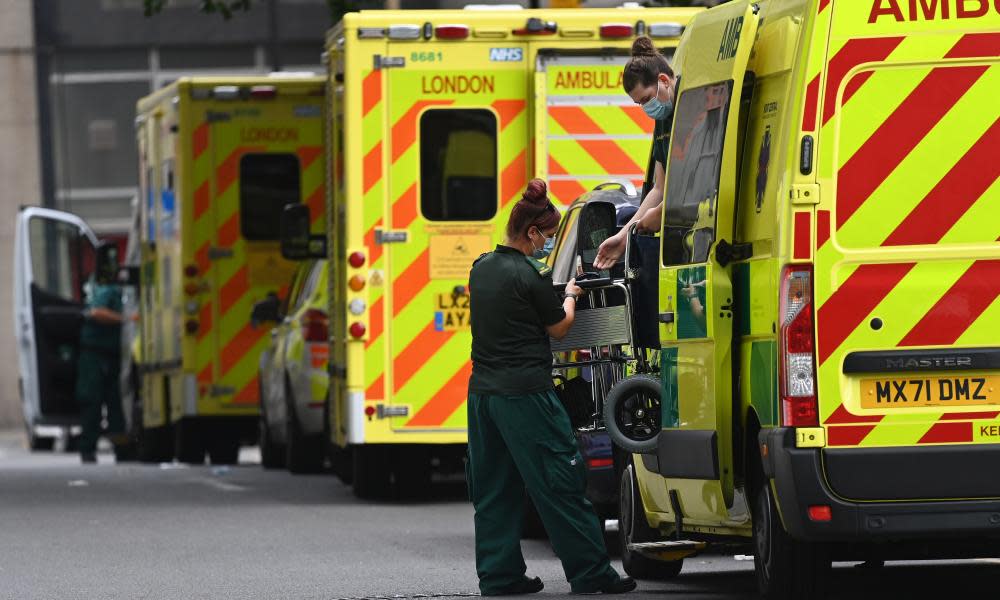GPs tell patients to ‘get an Uber’ as NHS ambulance delays hit record level

Some of the country’s GP are advising patients requiring urgent hospital care to “get an Uber” or use a relative’s car because of the worst ever delays in the ambulance service in England.
Patients with breathing difficulties and other potentially serious conditions are being told in some cases that they are likely to be transferred more quickly from a general practice to accident and emergency if they travel by cab or private vehicle.
NHS England data shows that October’s average ambulance response times for category 1 to 3 emergencies, which cover all urgent conditions, appear to be the highest since the categories were introduced nationally in 2017. Some patients who require emergency treatment may have to wait several hours for an ambulance to arrive.
Dr Selvaseelan Selvarajah, a GP partner in east London, said: “If somebody is not having a heart attack or a stroke, my default advice is ‘have you got someone who can drive you or do you want to get an Uber?’
“These are patients who may have breathing difficulty or are suffering severe abdominal pain, but their life is not in immediate danger.” He said such patients would have previously been transferred by ambulance.
Health bosses say the major delays in ambulance services are being caused by handover delays at A&E departments, with vehicles queueing for hours before their patients are seen.
The proportion of delays exceeding one hour in handovers from an ambulance to a hospital in England increased from 3% in October 2020 to 18% in October 2022, according to the latest figures published by the Association of Ambulance Chief Executives. The number of handovers exceeding an hour reached about 52,000 in October, the highest number to date.
Dr Neena Jha, who works as a locum GP in Hertfordshire, said: “I’ve never seen ambulance services stretched to this degree because of the pressures they are under. It’s really worrying when you’re dealing with an acutely unwell patient.
“If someone needs an urgent transfer to accident and emergency, we don’t rely on the ambulance service. We call taxis or get relatives to drive them in if they are going to be stable on the journey.
“I’ve had patients who have falling oxygen levels, who are quite unwell, and I have been quoted an 18-hour wait for an ambulance.”

Jha said it was often a dilemma as to whether to keep a patient at the practice and wait for an ambulance with oxygen on hand, or take the risk of them going unaccompanied to hospital to ensure they get faster access to the medical attention they need.
She said the delays in the ambulance service were highlighted when she was treating a baby this month at risk of cardiac arrest. She had initially been given a waiting time of two and a half hours and said the baby’s life may have been saved by the fact that a vehicle was redirected and reached the practice she was working at within 10 minutes.
It was reported in April that Deborah Lee, head of Gloucestershire Hospitals NHS foundation trust, was driven to hospital by her husband after a suspected stroke because he had heard her lamenting ambulance delays. She wrote on Twitter: “What if my husband hadn’t been there and my daughter called for an ambulance and I’d been put in the [Category 2] ‘stack’?”
GPs say they are increasingly concerned about the risk to patients because of wider failures in the health system. Doctors at a conference of local medical committee representatives on Thursday supported a motion which stated “general practice in England is unsafe due to a shortage of doctors and a lack of investment”.
Dr Kieran Sharrock, deputy chair of the General Practitioners Committee England at the British Medical Association, said: “We are committed to our patients and so we carry on, but we know that this trajectory for general practice cannot continue if it is to survive.”
The NHS says the problem of queueing ambulances at A&E departmentsis caused by hospitals being full to capacity, with delays in discharging patients into the community or social care. An NHS spokesperson said: “Ahead of what is likely to be a challenging winter for the NHS, services are facing considerable demand, with the busiest October ever for A&E attendances, difficulties discharging thousands of patients who are medically fit for discharge – and that is alongside new data this week showing a 10-fold increase in the number of flu cases in hospital compared to last year.
“NHS staff are working incredibly hard to prepare for the busy period with plans for new 24/7 system control centres, falls response services and additional beds and call handlers – so it is vital that people continue to come forward for care when they need it by using 999 and A&E in an emergency and 111 Online for other health conditions.”

 Yahoo Movies
Yahoo Movies 
